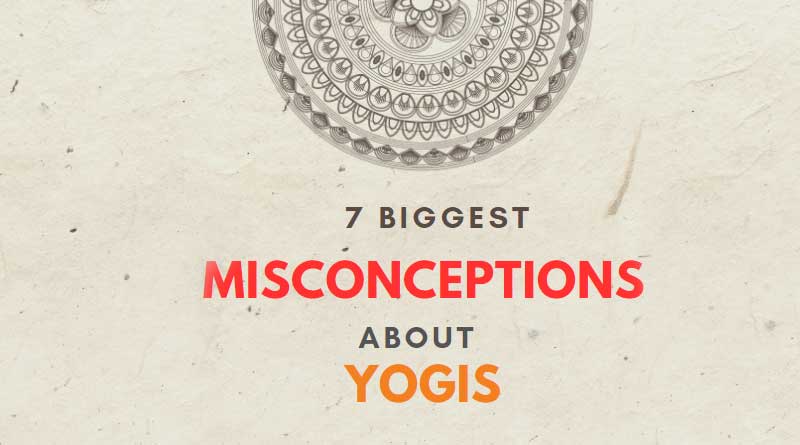Misconceptions about Yogis
Separating Fact from Fiction
Yoga, an ancient practice that originated in India, has gained immense popularity worldwide for its physical, mental, and spiritual benefits. Central to this practice are yogis, individuals who have dedicated their lives to mastering the art of yoga. However, over the years, misconceptions and stereotypes about yogis have arisen, often fuelled by media portrayals and cultural misunderstandings. In this blog, we will explore and debunk some of the most common misconceptions about yogis, shedding light on the reality of their lifestyles and the true essence of yoga.
Misconception #1: Yogis Are Mystical and Have Supernatural Powers
One of the most prevalent misconceptions about yogis is that they possess supernatural powers and are capable of performing miraculous feats. This notion is perpetuated by movies, books, and exaggerated stories. While yoga can lead to extraordinary physical and mental abilities, it is crucial to differentiate between the exceptional skills some yogis develop and supernatural powers.
In reality, yogis are ordinary individuals who have dedicated themselves to rigorous and disciplined practices. Through years of dedication, they may achieve impressive physical and mental feats, such as extreme flexibility, heightened awareness, or exceptional breath control. These achievements are the result of consistent practice and are not supernatural.
Misconception #2: Yogis Renounce All Material Possessions
Another common misconception is that yogis renounce all material possessions and live as ascetics, detached from the material world. While it is true that some yogis choose a simple and minimalist lifestyle, not all follow this path. Yoga philosophy offers various paths to self-realization, and renunciation is just one of them.
Many yogis lead normal lives, balancing their spiritual practices with familial responsibilities, careers, and modern amenities. Yoga teaches balance and harmonise, not necessarily the complete rejection of material possessions. The goal is to find inner peace, joy and contentment, whether one lives a minimalist lifestyle or not it’s completely on them.
Misconception #3: Yogis Are Always Calm and Serene
Yogis are often depicted as individuals who are always calm, serene, and free from anger or negative emotions. While yoga does promote inner peace and emotional stability, it does not mean yogis are immune to human emotions. They experience the full range of emotions, just like anyone else.
The key difference lies in how yogis manage their emotions. Through yoga and meditation, they develop techniques to remain centred and cultivate emotional resilience. They may be better equipped to handle stressful situations, but they are not devoid of emotions.
Misconception #4: Yogis Can Meditate for Hours without Distraction
Meditation is a fundamental aspect of yoga, and it is often assumed that yogis can effortlessly meditate for hours without any distractions. In reality, meditation is a skill that requires practice and patience. Even experienced yogis face challenges and distractions during their meditation sessions.
Yogis develop the ability to focus their minds through consistent practice. However, achieving deep states of meditation is a gradual process that can take years of dedicated effort. Distractions are a natural part of the meditation journey, and yogis learn to work with them rather than eliminate them entirely.
Misconception #5: Yogis Are Always Strict Vegetarians
Yoga philosophy emphasizes ahimsa (non-violence) and encourages a vegetarian diet as a means of reducing harm to other living beings. While many yogis choose to follow a vegetarian or vegan diet, it is not a strict requirement for all practitioners.
Dietary choices among yogis can vary widely, and some may include animal products in their diet while still maintaining a strong commitment to yoga principles. Yoga encourages mindful eating and listening to one’s body, and dietary choices should align with an individual’s ethical and health considerations.
Misconception #6: Yogis Are All Celibate
Another misconception that has persisted is the belief that all yogis practice celibacy or are celibate monks (They do not marry). In reality, celibacy is just one of many possible paths within the yogic tradition, and it is not a universal requirement for all practitioners.
Yoga acknowledges that individuals have different paths to self-realization, and celibacy is a choice made by some but not all. Some yogis may choose to marry and have families, while others embrace celibacy as a means of deepening their spiritual practice. It is essential to respect and honour these diverse paths and not impose a single stereotype on all yogis.
Ultimately, the yogic path is about individual growth, self-discovery, and self-realization. The choices one makes regarding celibacy or relationships should align with their personal journey and aspirations. It is essential to respect these diverse paths and not impose a one-size-fits-all stereotype on yogis.
Misconception #7: Yogis Are Anti-Social or Reclusive
Yogis are often portrayed as hermits or recluses who withdraw from society. While some yogis do choose a more solitary lifestyle to focus on their practice, it is not the only way to pursue yoga’s spiritual goals.
Many yogis actively engage with their communities, teach yoga classes, and contribute to society in various ways. Yoga teaches interconnectedness and compassion, and many yogis strive to share the benefits of yoga with others, promoting a more inclusive and social approach to the practice.
Conclusion
Misconceptions about yogis have persisted for generations, largely due to cultural stereotypes and sensationalized portrayals in the media. It is crucial to distinguish between these misconceptions and the authentic principles and experiences that define the yogic path.
Yogis are not mystical beings with supernatural powers, but individuals who have dedicated themselves to disciplined practice and self-realization. They are not immune to human emotions but have developed tools to navigate them effectively. Their meditation practice is not free from distractions but is a continuous journey of focus and self-discovery. They may follow a vegetarian diet, but dietary choices can vary. Celibacy is a choice for some yogis, but not a requirement for all. Lastly, yogis are not universally reclusive; many actively engage with their communities.
By debunking these misconceptions, we gain a deeper understanding of the true essence of yoga and the diverse paths that yogis choose to follow. Whether leading a simple or conventional life, yogis share a common commitment to inner peace, self-awareness, and the promotion of well-being for themselves and others. Recognizing these truths allows us to appreciate the multifaceted nature of yoga and the individuals who embark on this transformative journey.


